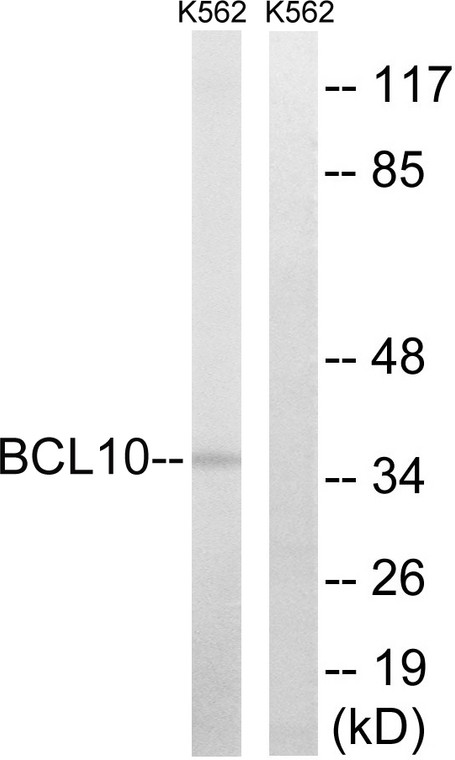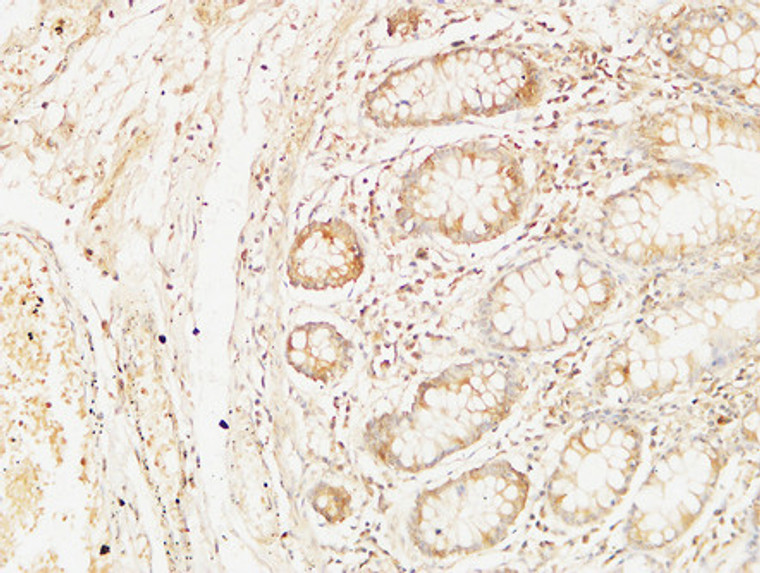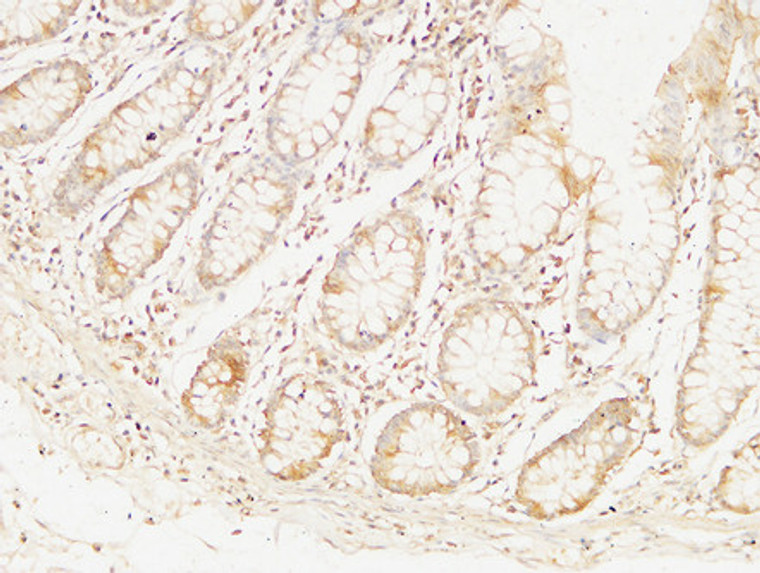| Host: |
Rabbit |
| Applications: |
WB/IHC/IF/ELISA |
| Reactivity: |
Human/Mouse/Rat |
| Note: |
STRICTLY FOR FURTHER SCIENTIFIC RESEARCH USE ONLY (RUO). MUST NOT TO BE USED IN DIAGNOSTIC OR THERAPEUTIC APPLICATIONS. |
| Short Description: |
Rabbit polyclonal antibody anti-B-cell lymphoma/leukemia 10 (111-160 aa) is suitable for use in Western Blot, Immunohistochemistry, Immunofluorescence and ELISA research applications. |
| Clonality: |
Polyclonal |
| Conjugation: |
Unconjugated |
| Isotype: |
IgG |
| Formulation: |
Liquid in PBS containing 50% Glycerol, 0.5% BSA and 0.02% Sodium Azide. |
| Purification: |
The antibody was affinity-purified from rabbit antiserum by affinity-chromatography using epitope-specific immunogen. |
| Concentration: |
1 mg/mL |
| Dilution Range: |
WB 1:500-1:2000IHC 1:100-1:300ELISA 1:40000IF 1:50-200 |
| Storage Instruction: |
Store at-20°C for up to 1 year from the date of receipt, and avoid repeat freeze-thaw cycles. |
| Gene Symbol: |
BCL10 |
| Gene ID: |
8915 |
| Uniprot ID: |
BCL10_HUMAN |
| Immunogen Region: |
111-160 aa |
| Specificity: |
Bcl-10 Polyclonal Antibody detects endogenous levels of Bcl-10 protein. |
| Immunogen: |
The antiserum was produced against synthesized peptide derived from the human BCL10 at the amino acid range 111-160 |
| Post Translational Modifications | Phosphorylated. Phosphorylation results in dissociation from TRAF2 and binding to BIRC2/c-IAP2. Phosphorylated by IKBKB/IKKB. Ubiquitinated via both 'Lys-63'-linked and linear ('Met-1'-linked) polyubiquitin chains in response to T-cell receptor (TCR) activation. Ubiquitination is recognized by IKBKG/NEMO, the regulatory subunit of I-kappa-B kinase (IKK), and is required for TCR-induced NF-kappa-B activation. Linear ubiquitination at Lys-17, Lys-31 and Lys-63 is mediated by RNF31/HOIP.linear ubiquitination is recognized with much higher affinity than 'Lys-63'-linked ubiquitin by IKBKG/NEMO. CARD11 is required for linear ubiquitination by HOIP by promoting the targeting of BCL10 to RNF31/HOIP. Proteolytically cleaved by MALT1.required for T-cell activation. |
| Function | Plays a key role in both adaptive and innate immune signaling by bridging CARD domain-containing proteins to immune activation. Acts by channeling adaptive and innate immune signaling downstream of CARD domain-containing proteins CARD9, CARD11 and CARD14 to activate NF-kappa-B and MAP kinase p38 (MAPK11, MAPK12, MAPK13 and/or MAPK14) pathways which stimulate expression of genes encoding pro-inflammatory cytokines and chemokines. Recruited by activated CARD domain-containing proteins: homooligomerized CARD domain-containing proteins form a nucleating helical template that recruits BCL10 via CARD-CARD interaction, thereby promoting polymerization of BCL10, subsequent recruitment of MALT1 and formation of a CBM complex. This leads to activation of NF-kappa-B and MAP kinase p38 (MAPK11, MAPK12, MAPK13 and/or MAPK14) pathways which stimulate expression of genes encoding pro-inflammatory cytokines and chemokines. Activated by CARD9 downstream of C-type lectin receptors.CARD9-mediated signals are essential for antifungal immunity. Activated by CARD11 downstream of T-cell receptor (TCR) and B-cell receptor (BCR). Promotes apoptosis, pro-caspase-9 maturation and activation of NF-kappa-B via NIK and IKK. |
| Protein Name | B-Cell Lymphoma/Leukemia 10B-Cell Cll/Lymphoma 10Bcl-10Card-Containing Molecule Enhancing Nf-Kappa-BCard-Like Apoptotic ProteinHclapCed-3/Ich-1 Prodomain Homologous E10-Like RegulatorCiperCellular Homolog Of VcarmenCcarmenCellular-E10C-E10Mammalian Card-Containing Adapter Molecule E10Me10 |
| Database Links | Reactome: R-HSA-1169091Reactome: R-HSA-202424Reactome: R-HSA-2871837Reactome: R-HSA-5607764Reactome: R-HSA-8866654 |
| Cellular Localisation | CytoplasmPerinuclear RegionMembrane RaftAppears To Have A PerinuclearCompact And Filamentous Pattern Of ExpressionAlso Found In The Nucleus Of Several Types Of Tumor CellsColocalized With Dpp4 In Membrane Rafts |
| Alternative Antibody Names | Anti-B-Cell Lymphoma/Leukemia 10 antibodyAnti-B-Cell Cll/Lymphoma 10 antibodyAnti-Bcl-10 antibodyAnti-Card-Containing Molecule Enhancing Nf-Kappa-B antibodyAnti-Card-Like Apoptotic Protein antibodyAnti-Hclap antibodyAnti-Ced-3/Ich-1 Prodomain Homologous E10-Like Regulator antibodyAnti-Ciper antibodyAnti-Cellular Homolog Of Vcarmen antibodyAnti-Ccarmen antibodyAnti-Cellular-E10 antibodyAnti-C-E10 antibodyAnti-Mammalian Card-Containing Adapter Molecule E10 antibodyAnti-Me10 antibodyAnti-BCL10 antibodyAnti-CIPER antibodyAnti-CLAP antibody |
Information sourced from Uniprot.org
12 months for antibodies. 6 months for ELISA Kits. Please see website T&Cs for further guidance











